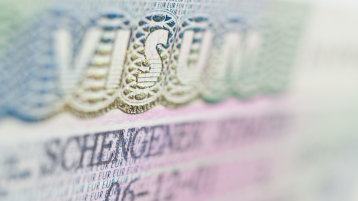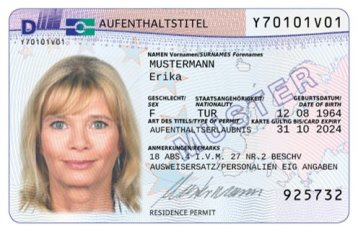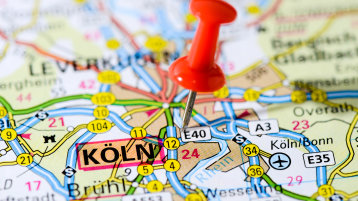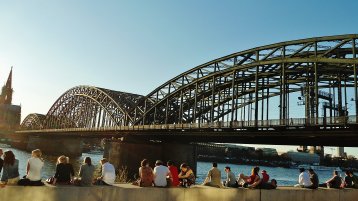Visa and Residence Permit

International (prospective) students, exchange students and guest scholars usually require a visa to enter Germany as well as a residence permit for a longer stay. Make sure to inform yourself in time whether you need a visa and – if you do – what type of visa you require and where you can obtain it.
Jump to
Do I need a visa?
Whether you need a visa to enter Germany as well as which type of visa you need, depends on
- your citizenship,
- the duration of your stay,
- the reason of your stay.
You can check in the Visa Navigator whether you need a visa and how to apply for it.
EU-/EEA-citizens and citizens of Switzerland
Citizens of the European Union as well as Iceland, Liechtenstein, Norway and Switzerland can enter Germany without a visa. You are solely required to have a valid official ID card or passport. As soon as you have found permanent accommodation, please register your address of residence with the residents’ registration office responsible for you. You also do not need a residence permit for your stay in Germany.
Non-EU-/EEA-citizens
Citizens from countries outside the EU/EEA generally require a visa to enter Germany. Please apply for a visa at the German embassy or German consulate in your home country. If you intend to enroll in a degree program at TH Köln, you will need to apply for a national visa for "study purposes" (Visum zu Studienzwecken). If you participate in a preparatory German course, please apply for a national visa for "preparation of studies" (Visum zur Studienvorbereitung). Guest scholars usually apply for a national visa for "research" (Forschungsvisum).
Important notice: If you are planning to study or do research at TH Köln within the scope of a mobility scheme (e.g. Erasmus), you will have to follow the European directive EU2016/801.
A valid residence permit from the EU country)* you are currently studying in/doing research is sufficient for your entry into Germany. This means that you do not need to apply for another visa. You just need to submit certain documents to TH Köln. The Department of International Affairs will contact you in time via e-mail informing you on the next steps to be taken.
)*Denmark and Ireland are excluded from this regulation.
Exemptions for certain countries
Citizens of certain countries may be able to enter Germany without a visa, but must then apply for a residence permit within 90 days of entry. Please check the Visa Navigator of the Federal Foreign Office to see if this applies to your country. In general, we do recommend to apply for a visa, if the German embassy in your country accepts a visa application. Please note that re-entry after leaving Germany is only possible with a visa with the addition "MULT" (multiple entries) or a residence permit. Gainful employment (part-time job) is also only possible with a visa or residence permit.
Staying for less than 90 days?
If you are planning a stay in Germany for less than 90 days - for example, for a meeting in presence in an online degree program, a summer school, a short internship or participation in a conference - only nationals of countries with visa requirements require a so-called Schengen visa. Please note that a Schengen visa for a tourist stay cannot be converted into a national visa for study purposes, preparation for studies or work for a longer-term stay, nor can a residence permit be issued. This means you must leave the country after 90 days at the latest.
Where, when and how do I apply for a visa?
You apply for a visa at the German mission in your home country. Please check how to submit your visa application in the Consular Services Portal.
We recommend that you make a visa appointment for study or research purposes as early as possible. In some countries the waiting time for an appointment is more than 6 months. You can also apply for an appointment without an admission letter or invitation letter.
To apply in person, you must then present your letter of admission or letter of invitation to TH Köln. This also applies to exchange students or guest scholars who need a visa.
The embassy website or the Consular Services Portal will tell you what other documents are required for your visa application.
Information on the proof of financing for international students and applicants
In order to obtain a visa receive a residence permit or extend your residence permit, you must prove that you can manage your studies financially.
Currently, you have to prove 992 EUR per month, meaning 11.904 EUR for one year (as of 08/2024).
You can prove it in the form of proof of income from your parents, a security amount in a blocked account, a bank guarantee, a recognised scholarship or a student job in Germany. Ask the German embassy or consulate in your country about the conditions. When you are already in Germany, ask the Immigration Office where you are registered.
Many international students use a blocked account to prove their finances. The amount of money transferred will be blocked in favor of the Immigration Office.
Please note
TH Köln is unfortunately not able to influence or accelerate visa issuance processes of embassies, consulates or immigration offices.
Do I need a residence permit?
Exception
Non-EU-/EEA-citizens, who entered Germany via European directive EU2016/801, do not need a residence permit for their stay in Germany.
The visa issued by the German embassy in your home country is usually only valid for the entry into Germany and the first year of your stay in Germany. Therefore, non-EU-/EEA-citizens must apply for a residence permit at the Immigration Office within the validity of the visa.
Please pay attention to the maximum duration of stay noted in your personal visa.
Non-EU-/EEA-citizens, who were allowed to enter without a visa, must also apply for a residence permit at the Immigration Office if they wish to stay in Germany for longer than three months. Please note that re-entry after leaving Germany is only possible with a residence permit. Gainful employment (part-time job) is also only possible with a residence permit.
 Musterbild eines elektronischen Aufenthaltstitels
(Image: BAMF)
Musterbild eines elektronischen Aufenthaltstitels
(Image: BAMF)
You must request this residence permit during the validity period of your entry visa, or within the first three months of your entry. The residence permit is issued as a chip card and bears the official German title ‘elektronischer Aufenthaltstitel (eAT)’. It is usually valid for two years and therefore needs to be renewed every other year.
Please present the following documents to the Immigration Office when you request your residence permit:
- Application for a residence permit (initial application), can be submitted in paper form or via online form. Please search for the form on the website of the immigration office responsible for you.
- copy of your valid passport – including your visa, if applicable and entry stamp
- biometric passport photograph (35x45 mm, not older than 3 months)
- certificate of registration with the residents' registration office, rental contract, signed confirmation from your landlord*landlady (Wohnungsgeberbescheinigung)
- for international students: certificate of enrollment of TH Köln
- for international guest scholars: letter of invitation
- certificate of health insurance
- proof of financial resources: 992 EUR per month, meaning 11.904 EUR for one year (as of 08/2024).
In some cases, the Immigration Office may require you to hand in other documents as well. If required, your immigration officer will inform you accordingly.
We have listed the most important immigration offices for you.
Make sure that you submit the necessary documents in addition to your initial application for a residence permit. You will only receive an appointment once all documents have been submitted.
Please refer to the pages of the Immigration Offices for information on how to submit the documents and how to make an appointment. Each Immigration Office has its own procedure.
If you have any questions, please do not hesitate to contact the Team International Degree-Seeking Students. We will be happy to advise you.
Where, when and how do I extend my residence permit?
In order to extend your residence permit, please contact your responsible Immigration Office in good time (approx. 3 months in advance) within the validity period of your previously issued residence permit.
In order to extend your Residence Permit, please contact
Certificate of study progress
You can obtain the certificate of study progress from the
The following documents are usually required for an extension of your residence permit:
- Application for extension of a residence permit, can be submitted in paper form or via online form. Please search for the form on the website of the foreigners authority responsible for you.
- copy of your valid passport
- biometric passport photograph (35x45 mm, not older than 3 months)
- certificate of registration with the residents' registration office, rental contract, signed confirmation from your landlord*landlady (Wohnungsgeberbescheinigung)
- for international students: certificate of enrollment of TH Köln
- for international students: certificate of your study progress / transcript of records. The certificate of your study progress contains information about your academic achievements to date and the expected end of your studies.
- for international guest scholars: letter of invitation
- certificate of health insurance
- proof of financial resources: 992 EUR per month, meaning 11.904 EUR for one year (as of 08/2024).
Please note that you must prove that you have sufficient financial means for the duration of your studies in Germany each time your residence permit is extended. Please inform yourself about your possibilities at the Immigration Office responsible for you.
If you have any questions, please do not hesitate to contact the Team International Degree-Seeking Students. We will be happy to advise you.
Prospects after graduation
Ready, Study, Go
If you would like to prepare for entering the German job market before you graduate, we can help you make contact with potential employers at an early stage.
Germany is a land of opportunities - even after you graduate. Use the time to plan your next steps well and find out about your options. Whether you want to work in Germany, do research or set up your own company, there are numerous ways to shape your future here.
Tip: If you want to continue living in Germany after your studies, you must apply for the relevant residence permit BEFORE your residence permit for study purposes expires.
I come from the EU, the EEA or Switzerland
If you come from the EU, Switzerland, Liechtenstein, Norway or Iceland, you can live and work in Germany without any restrictions. Make it in Germany has provided important information on this.
I will soon be completing my studies but have not yet found a suitable job.
After successfully completing your studies, you can apply for a residence permit to seek employment (Section 20 (1) Residence Act). This is valid for up to 18 months. During this time, you have the opportunity to find qualified employment.
TIP: Apply for this residence permit as soon as possible after passing your last exam.
During the period of the residence permit to seek employment, any gainful work is permitted. However, you should not lose sight of the fact that as soon as you have found qualified employment, you should apply for a change to a residence permit for the purpose of gainful employment.
For the application you will need
- Proof of successfully completed studies
- Proof of health insurance cover
- Proof of financial resources
I have found a suitable job, what do I do now?
If you come from a country outside the EU, you can apply for a residence permit for qualified professionals (§18b AufenthG) or the EU Blue Card (§18g AufenthG) if you have a suitable job offer in Germany.
It is important to note that your job does not have to be directly related to your studies for the residence permit for skilled employment - but it does for the EU Blue Card. For the EU Blue Card, you must provide proof of a certain minimum salary. If you want to work in a regulated profession, you will also need a permit for this.
You will need the following for your application:
- Proof that you have successfully completed your studies
- Proof of health insurance cover
- Proof that you are able to support yourself (usually your employment contract)
Which residence permit is the right one for you depends on your personal situation.
Advantages of the EU Blue Card compared to a residence permit for qualified professionals
- The change of job does not have to be approved by the immigration authorities.
- You have the right to bring your family to join you without your family having to be able to speak German.
- The deadlines for obtaining a settlement permit are shortened.
You can also obtain a residence permit with a part-time job as long as your salary is sufficient to live on. The foreigners authority will decide on this.
I would like to start my own business/do free-lancing/work as a self-employed person.
The residence permit for self-employment (§21 AufenthG) is initially issued for up to three years. If your business idea is successful and you can finance your livelihood and that of your family, the residence permit can be extended.
Proof must be provided for the application:
- that the self-employed activity is related to the knowledge acquired during your studies,
- that your livelihood is secured.
Take advantage of the services offered by TH Köln to prepare for your self-employment or your start-up idea.
The TH Köln Gateway supports you with your start-up idea
Some faculties also have their own programs to support start-ups.
I would like to do a doctorate (PhD).
Rights of residence for researchers from non-EU countries in Germany
If you come from a third country and would like to do a PhD in Germany, you will need either a residence permit for study purposes (§16b AufenthG), a residence permit for research purposes (§18d AufenthG) or an EU Blue Card (§18g AufenthG) - depending on how much you work during your doctorate and how much you earn.
The Graduate Center at TH Köln will be happy to advise you.
And what comes next?
If you have been in qualified employment for two to three years, you can apply for a permanent settlement permit (§9 AufenthG) for Germany.
After 3-5 years of residence in Germany (your studies count here), you could also apply for German citizenship - and may retain your own citizenship. As a rule, you must prove that you speak German at level C1 and have a permanent employment contract.
Both the settlement permit and German citizenship require the following:
- Securing a livelihood (also for family members in Germany)
- Commitment to the free and democratic basic order and to Germany's special historical responsibility
- No significant criminal record
- Knowledge of the legal and social order, as evidenced by the “Life in Germany” examination




